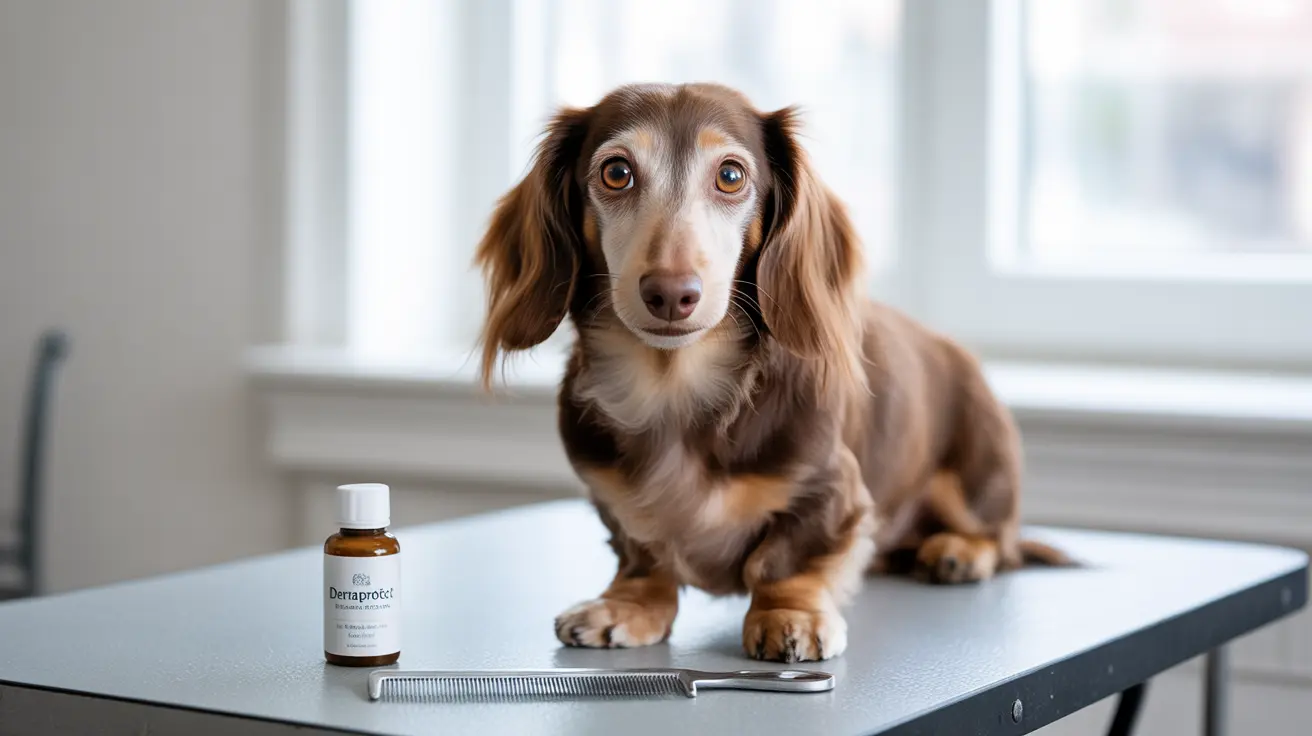Seborrhea in dogs is a challenging skin condition that affects many canines, causing uncomfortable symptoms like excessive dandruff, greasy skin, and unpleasant odors. This chronic skin disorder occurs when there's an abnormal production of sebum, the natural oil that keeps your dog's skin healthy and moisturized. Understanding this condition is crucial for effective management and your pet's comfort.
Whether your dog is showing early signs of seborrhea or has been diagnosed with this condition, this comprehensive guide will help you understand its causes, recognize symptoms, and explore treatment options. Let's dive into everything you need to know about managing seborrhea in dogs.
Types of Canine Seborrhea
Seborrhea presents in two main forms: dry (seborrhea sicca) and oily (seborrhea oleosa). Many dogs experience a combination of both types, making proper diagnosis and treatment essential.
Dry Seborrhea (Seborrhea Sicca)
This form manifests as dry, flaky skin similar to dandruff. Dogs with dry seborrhea often show excessive scaling and might scratch frequently due to skin irritation. Breeds like Cocker Spaniels and Dachshunds are particularly prone to this type.
Oily Seborrhea (Seborrhea Oleosa)
Characterized by greasy, oily skin and a distinct odor, this form can make your dog's coat appear wet or sticky. The excess oil often traps dirt and debris, leading to secondary skin infections if not properly managed.
Common Causes and Risk Factors
Seborrhea typically occurs in two forms: primary (inherited) and secondary (acquired). Primary seborrhea is rare and genetic, while secondary seborrhea results from underlying health conditions.
Primary Causes
- Genetic predisposition in certain breeds
- Inherited metabolic disorders
- Congenital skin abnormalities
Secondary Causes
- Hormonal imbalances (hypothyroidism, Cushing's disease)
- Allergies (environmental or food-related)
- Parasitic infections
- Nutritional deficiencies
- Bacterial or fungal infections
Diagnosis and Treatment Options
Proper diagnosis of seborrhea requires a comprehensive veterinary examination. Your vet will likely perform several tests to identify the underlying cause and determine the most effective treatment approach.
Diagnostic Methods
- Physical examination
- Skin scraping and culture tests
- Blood work for hormonal issues
- Allergy testing
- Skin biopsies when necessary
Treatment Strategies
Treatment typically involves a multi-faceted approach:
- Medicated shampoos containing ingredients like:
- Coal tar
- Salicylic acid
- Benzoyl peroxide
- Sulfur
- Regular bathing schedule
- Treatment of underlying conditions
- Dietary supplements when needed
- Medications for secondary infections
Prevention and Management
While some cases of seborrhea can't be prevented, particularly inherited forms, several steps can help manage the condition:
- Regular grooming and skin monitoring
- High-quality diet rich in essential fatty acids
- Proper humidity levels in the home
- Quick response to early symptoms
- Regular veterinary check-ups
Frequently Asked Questions
What are the common causes of seborrhea in dogs?
Seborrhea in dogs can be caused by hormonal imbalances, allergies, parasitic infections, nutritional deficiencies, and genetic predisposition. Secondary seborrhea is more common and typically results from underlying health conditions.
How do I diagnose seborrhea in my dog, and what tests are typically involved?
Diagnosis involves a comprehensive veterinary examination, including physical assessment, skin scraping tests, blood work, and potentially skin biopsies. Your vet will work to identify both the seborrhea and any underlying conditions.
What is the best way to treat seborrhea in dogs, and can it be managed at home?
Treatment typically combines medicated shampoos, regular bathing, and addressing underlying conditions. Home management includes consistent grooming, proper diet, and following your vet's prescribed treatment plan.
Can seborrhea in dogs be prevented, and what role does diet play in its management?
While inherited seborrhea can't be prevented, maintaining good nutrition, regular grooming, and prompt veterinary care can help prevent secondary seborrhea. A balanced diet rich in essential fatty acids is crucial for skin health.
Is seborrhea in dogs contagious to humans or other pets?
No, seborrhea itself is not contagious to humans or other pets. However, secondary infections that may develop due to seborrhea could potentially be transmissible, depending on the cause.






